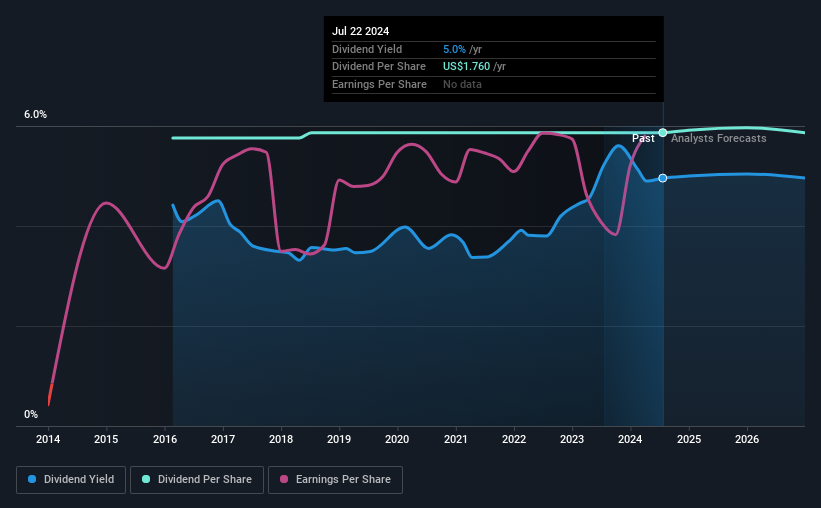
The board of Avangrid, Inc. (NYSE:AGR) has announced that it will pay a dividend of $0.44 per share on the 1st of October. Based on this payment, the dividend yield on the company's stock will be 5.0%, which is an attractive boost to shareholder returns.
View our latest analysis for Avangrid
Avangrid's Dividend Is Well Covered By Earnings
A big dividend yield for a few years doesn't mean much if it can't be sustained. Before making this announcement, Avangrid was paying out a fairly large proportion of earnings, and it wasn't generating positive free cash flows either. We think that this practice can make the dividend quite risky in the future.
The next year is set to see EPS grow by 10.3%. If the dividend continues along recent trends, we estimate the payout ratio will be 72%, which would make us comfortable with the sustainability of the dividend, despite the levels currently being quite high.

Avangrid Doesn't Have A Long Payment History
The dividend's track record has been pretty solid, but with only 8 years of history we want to see a few more years of history before making any solid conclusions. Since 2016, the annual payment back then was $1.73, compared to the most recent full-year payment of $1.76. Dividend payments have been growing, but very slowly over the period. We like that the dividend hasn't been shrinking. However we're conscious that the company hasn't got an overly long track record of dividend payments yet, which makes us wary of relying on its dividend income.
The Dividend's Growth Prospects Are Limited
Investors who have held shares in the company for the past few years will be happy with the dividend income they have received. Earnings has been rising at 4.7% per annum over the last five years, which admittedly is a bit slow. Slow growth and a high payout ratio could mean that Avangrid has maxed out the amount that it has been able to pay to shareholders. When the rate of return on reinvestment opportunities falls below a certain minimum level, companies often elect to pay a larger dividend instead. This is why many mature companies often have larger dividend yields.
Avangrid's Dividend Doesn't Look Sustainable
In summary, while it's good to see that the dividend hasn't been cut, we are a bit cautious about Avangrid's payments, as there could be some issues with sustaining them into the future. The payments are bit high to be considered sustainable, and the track record isn't the best. We would probably look elsewhere for an income investment.
Market movements attest to how highly valued a consistent dividend policy is compared to one which is more unpredictable. Meanwhile, despite the importance of dividend payments, they are not the only factors our readers should know when assessing a company. Case in point: We've spotted 2 warning signs for Avangrid (of which 1 is potentially serious!) you should know about. If you are a dividend investor, you might also want to look at our curated list of high yield dividend stocks.
New: Manage All Your Stock Portfolios in One Place
We've created the ultimate portfolio companion for stock investors, and it's free.
• Connect an unlimited number of Portfolios and see your total in one currency
• Be alerted to new Warning Signs or Risks via email or mobile
• Track the Fair Value of your stocks
Have feedback on this article? Concerned about the content? Get in touch with us directly. Alternatively, email editorial-team (at) simplywallst.com.
This article by Simply Wall St is general in nature. We provide commentary based on historical data and analyst forecasts only using an unbiased methodology and our articles are not intended to be financial advice. It does not constitute a recommendation to buy or sell any stock, and does not take account of your objectives, or your financial situation. We aim to bring you long-term focused analysis driven by fundamental data. Note that our analysis may not factor in the latest price-sensitive company announcements or qualitative material. Simply Wall St has no position in any stocks mentioned.
Have feedback on this article? Concerned about the content? Get in touch with us directly. Alternatively, email editorial-team@simplywallst.com
About NYSE:AGR
Avangrid
An energy services holding company, engages in the regulated energy transmission and distribution, and renewable energy generation businesses in the United States.
Undervalued with solid track record.
Similar Companies
Market Insights
Community Narratives


